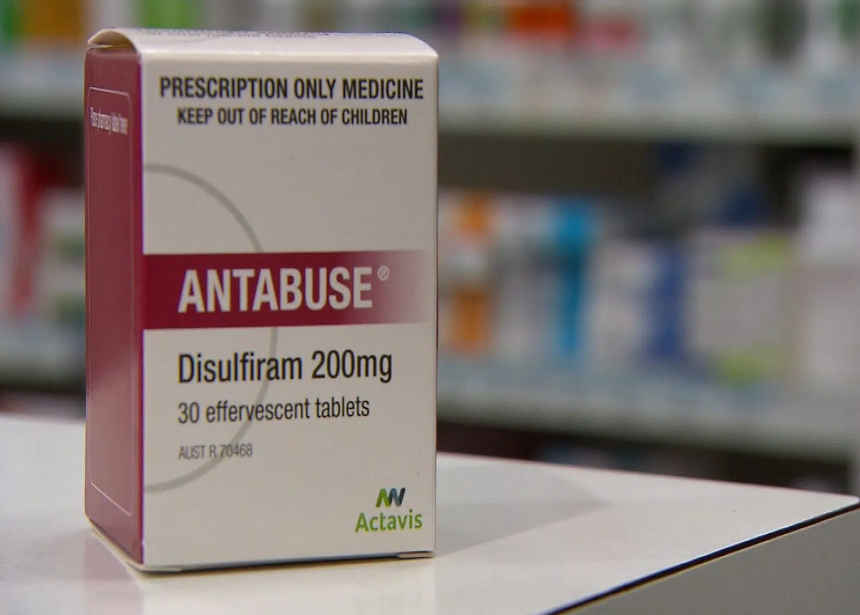
Table of contents
What is Antabuse
Antabuse, also known by its generic name disulfiram, is a medication used in the management of chronic alcoholism. It works by interfering with the way the body metabolizes alcohol, causing unpleasant effects when alcohol is consumed. This reaction is intended to discourage individuals from drinking alcohol and to support their efforts to remain sober.
The mechanism of action of Antabuse involves blocking the enzyme acetaldehyde dehydrogenase, which is necessary for the metabolism of alcohol. When alcohol is consumed, it is normally broken down into acetaldehyde, and then into acetic acid. Antabuse prevents the breakdown of acetaldehyde, leading to its accumulation in the body and causing a series of unpleasant symptoms.
Common reactions to alcohol consumption while taking Antabuse include flushing, nausea, vomiting, headache, and palpitations. These symptoms can occur within minutes of drinking alcohol and can last for several hours. The severity of the reaction often deters individuals from continuing to drink, thus supporting their commitment to sobriety.
Antabuse is typically used as part of a comprehensive treatment program for alcoholism that includes counseling and support. It is not a cure for alcoholism but can be an effective deterrent for those who are motivated to quit drinking. It is essential for patients to be fully informed about the potential reactions and to have a support system in place while using this medication.
Antabuse Indications
Antabuse is primarily indicated for the treatment of chronic alcoholism. It is used as a deterrent to drinking in individuals who have a strong desire to remain sober. The medication is most effective when used in combination with counseling and support groups, as it addresses the physical aspect of addiction while other forms of therapy address the psychological and emotional aspects.
Another indication for Antabuse is in the management of patients who have repeatedly failed to maintain sobriety despite other interventions. For these individuals, the fear of experiencing severe reactions to alcohol can provide the additional motivation needed to abstain from drinking. This makes Antabuse a valuable tool in a comprehensive treatment plan.
Antabuse may also be used in situations where supervised administration of the medication is possible, such as in residential treatment programs or under the care of a family member or close friend. This supervision helps ensure adherence to the medication regimen, increasing its effectiveness as a deterrent to alcohol consumption.
Lastly, Antabuse can be considered for use in patients with a high risk of relapse due to stressful situations or social environments where alcohol consumption is prevalent. By taking Antabuse, these individuals can reduce the likelihood of giving in to the temptation to drink, thereby maintaining their sobriety in challenging circumstances.
Antabuse Side Effects
Antabuse can cause a range of side effects, some of which are related to its interaction with alcohol, while others are due to the medication itself. Patients should be aware of these potential side effects before starting treatment.
Common Side Effects
- Drowsiness
- Headache
- Metallic or garlic-like taste in the mouth
Severe Side Effects
- Severe liver problems, including hepatitis and liver failure
- Severe skin reactions, such as rash, itching, or peeling
- Neurological issues, including numbness, tingling, and optic neuritis
Reactions with Alcohol
When alcohol is consumed while taking Antabuse, it can cause severe reactions, which may include:
- Flushing of the face
- Throbbing headache
- Nausea and vomiting
- Chest pain
- Rapid heartbeat (tachycardia)
- Shortness of breath
- Dizziness and fainting
These reactions can be dangerous and potentially life-threatening, especially if large amounts of alcohol are consumed. Patients must be fully aware of these risks and avoid alcohol in all forms, including in foods, medications, and other products.
How to Use Antabuse
Using Antabuse properly is essential for its effectiveness and safety. Here are some key points to consider:
- Follow your doctor's prescription carefully.
- Take Antabuse at the same time every day, with or without food.
- Avoid all forms of alcohol, including in food, medications, and personal care products.
- Inform healthcare providers that you are taking Antabuse before receiving any new medications or treatments.
- Report any side effects or unusual symptoms to your doctor promptly.
- Attend all scheduled follow-up appointments to monitor your progress.
- Participate in counseling and support groups as recommended by your healthcare provider.
How to Buy Antabuse in the USA
Purchasing Antabuse in the USA requires a prescription from a licensed healthcare provider. Here are the steps to follow:
1. Schedule an appointment with your doctor to discuss your need for Antabuse.
2. Obtain a prescription if your doctor determines that Antabuse is appropriate for your treatment plan.
3. Take the prescription to a pharmacy, or use an online pharmacy service if preferred.
4. Verify the pharmacy's credentials to ensure it is a legitimate and licensed provider.
5. Check if your insurance covers the cost of Antabuse, or inquire about any available discounts or patient assistance programs.
6. Follow the pharmacist's instructions for taking Antabuse and ask any questions you may have about the medication.
Prices for Antabuse in the USA
The cost of Antabuse can vary depending on several factors, including the pharmacy, your insurance coverage, and available discounts. Here is a general overview of price ranges:
- Without insurance: $50 to $100 for a one-month supply (usually 30 tablets of 250 mg).
- With insurance: Co-pays may range from $10 to $30, depending on your plan.
- Generic versions (disulfiram): Typically lower in cost, ranging from $30 to $70 for a one-month supply.
- Online pharmacies: Prices may vary, but ensure the pharmacy is reputable and requires a valid prescription.
- Discount programs: Some pharmacies offer discount cards or programs that can reduce the cost by up to 50%.
Antabuse Dosages and Differences
Antabuse is available in different dosages, primarily in tablet form. The most common dosages are:
- 250 mg tablets
- 500 mg tablets
The typical starting dose for Antabuse is 500 mg daily for 1 to 2 weeks, followed by a maintenance dose of 250 mg daily. The exact dosage and duration of treatment depend on the patient's medical condition, response to therapy, and the doctor's recommendations.
The main difference between the dosages lies in their use during the initial and maintenance phases of treatment. Higher doses (500 mg) are usually used at the start to establish the medication's presence in the system, while lower doses (250 mg) are sufficient for ongoing maintenance to prevent alcohol consumption.
It's crucial for patients to follow their doctor's dosing instructions carefully and not to adjust the dosage without medical advice. Regular follow-up appointments are necessary to monitor the treatment's effectiveness and make any necessary adjustments.
Antabuse: An Indispensable Method for Treating Alcoholism
Antabuse, also known by its generic name disulfiram, is a well-established medication used in the treatment of chronic alcoholism. It plays a crucial role in helping individuals who are committed to maintaining sobriety by creating a strong deterrent to alcohol consumption. The effectiveness of Antabuse in treating alcoholism can be attributed to its unique mechanism of action and the comprehensive support it provides in the recovery process.
Mechanism of Action
Antabuse works by interfering with the body's ability to metabolize alcohol. Specifically, it inhibits the enzyme acetaldehyde dehydrogenase, which is involved in the breakdown of alcohol. When alcohol is consumed while taking Antabuse, acetaldehyde accumulates in the body, leading to unpleasant physical reactions. These reactions can include:
- Severe nausea and vomiting
- Flushing of the face
- Throbbing headache
- Chest pain
- Dizziness
- Rapid heartbeat
- Difficulty breathing
These adverse effects occur within minutes of alcohol consumption and can last for several hours, making the experience of drinking extremely unpleasant. This aversive conditioning helps to reinforce the desire to avoid alcohol.
Benefits of Antabuse
- Deterrence from Drinking: The fear of experiencing the severe reactions caused by drinking alcohol while on Antabuse serves as a powerful deterrent, helping individuals to stay committed to their sobriety.
- Support in Early Recovery: Antabuse is particularly beneficial during the early stages of recovery when the risk of relapse is high. It provides an added layer of protection against the temptation to drink.
- Psychological Reinforcement: The use of Antabuse can enhance the psychological commitment to sobriety, as individuals are aware of the immediate and severe consequences of drinking.
- Part of a Comprehensive Treatment Plan: Antabuse is most effective when used as part of a broader treatment plan that includes counseling, support groups, and lifestyle changes.
Considerations and Precautions
While Antabuse is a valuable tool in the treatment of alcoholism, it is important to use it under the supervision of a healthcare professional. Key considerations include:
- Ensuring that the patient is fully informed about the potential reactions and the importance of avoiding all forms of alcohol, including hidden sources like certain foods, medications, and hygiene products.
- Regular monitoring by a healthcare provider to assess the effectiveness and to manage any side effects or complications.
- Understanding that Antabuse is not a cure for alcoholism but a supportive measure that helps to reinforce sobriety.
- Combining Antabuse with counseling and support groups to address the psychological and social aspects of addiction.
In conclusion, Antabuse remains an indispensable method for treating alcoholism, offering a unique and effective way to deter alcohol consumption and support long-term recovery. Its success is maximized when integrated into a comprehensive treatment plan that includes medical supervision, counseling, and support networks.
Antabuse and Its Additional Therapeutic Uses
Antabuse, also known as disulfiram, is primarily known for its role in treating chronic alcoholism. By causing unpleasant reactions when alcohol is consumed, it helps individuals maintain sobriety. However, beyond its well-known application in alcohol dependency, Antabuse has potential therapeutic uses in other medical conditions. Here, we explore both its primary and additional applications.
Treatment of Alcoholism
Antabuse is most commonly prescribed to help individuals abstain from alcohol. Its mechanism of action involves inhibiting the enzyme acetaldehyde dehydrogenase, leading to an accumulation of acetaldehyde when alcohol is consumed. This results in unpleasant symptoms that deter alcohol intake, including:
- Severe nausea and vomiting
- Headaches
- Flushing
- Chest pain
- Dizziness
- Rapid heartbeat
These reactions serve as a powerful deterrent, helping patients remain sober and reinforcing their commitment to recovery.
Potential Uses Beyond Alcoholism
Recent research and clinical observations suggest that Antabuse may have therapeutic potential in treating other conditions due to its unique properties. Some of these potential applications include:
Cocaine Dependence
Antabuse has shown promise in treating cocaine dependence. It is believed to inhibit dopamine beta-hydroxylase, an enzyme involved in the conversion of dopamine to norepinephrine, potentially reducing the rewarding effects of cocaine use. This can help decrease cravings and use in individuals addicted to cocaine.
Fungal Infections
Disulfiram has demonstrated antifungal properties in laboratory studies. It has been tested as a potential treatment for certain fungal infections, particularly those resistant to conventional antifungal medications. More research is needed, but initial findings are promising.
Cancer Treatment
There is growing interest in the use of Antabuse as an adjunct therapy in cancer treatment. Some studies suggest that disulfiram may inhibit the growth of cancer cells and enhance the efficacy of chemotherapy. It has been particularly noted for its potential in treating certain types of breast cancer and glioblastoma.
Parasitic Infections
Antabuse has shown activity against various parasitic infections, including those caused by protozoa like Giardia and Entamoeba histolytica. Its mechanism in treating these infections is not fully understood, but its potential as an antiparasitic agent is being investigated.
Considerations and Precautions
While Antabuse holds promise for these additional uses, it is crucial to approach its application with caution. Considerations include:
- Consulting with a healthcare provider to evaluate the appropriateness of Antabuse for off-label uses.
- Monitoring for potential side effects and interactions with other medications.
- Conducting further research to establish the efficacy and safety of Antabuse in these new therapeutic areas.
In summary, while Antabuse is primarily used for treating alcoholism, its potential extends to other medical conditions such as cocaine dependence, fungal infections, cancer, and parasitic infections. Ongoing research and clinical trials will determine the full scope of its therapeutic benefits.
FAQ
What is Antabuse?
Antabuse (disulfiram) is a medication used to treat chronic alcoholism. It works by causing unpleasant effects when alcohol is consumed, discouraging individuals from drinking.
How does Antabuse work?
Antabuse works by blocking the enzyme acetaldehyde dehydrogenase, which is involved in the metabolism of alcohol. This leads to the accumulation of acetaldehyde in the blood when alcohol is consumed, causing unpleasant symptoms.
What are the common side effects of Antabuse?
Common side effects of Antabuse include drowsiness, headache, metallic taste in the mouth, skin rash, and acne-like skin eruptions. More severe reactions can occur if alcohol is consumed while taking Antabuse.
How long does Antabuse stay in your system?
Antabuse has a half-life of about 60 to 120 hours. It may take several weeks after discontinuing the medication for it to be completely eliminated from the body.
Can Antabuse cure alcoholism?
Antabuse is not a cure for alcoholism but is used as a deterrent to drinking. It should be used as part of a comprehensive treatment program that includes counseling and support groups.
Who should not take Antabuse?
Antabuse should not be taken by individuals with severe heart disease, psychosis, or a history of severe reactions to alcohol. Pregnant or breastfeeding women should also avoid Antabuse.
Can Antabuse be used without the person's knowledge?
No, Antabuse is prescribed under strict supervision and should not be used without the person's knowledge. It is crucial for individuals taking Antabuse to be aware of its effects to avoid accidental consumption of alcohol.
How effective is Antabuse in treating alcoholism?
Antabuse can be effective in treating alcoholism, especially when combined with counseling and support programs. It helps reinforce abstinence by creating a strong aversion to alcohol consumption.
Can Antabuse be used to help with occasional drinking?
No, Antabuse is specifically used to discourage alcohol consumption and should not be used as a method to control or limit occasional drinking. It is designed to maintain abstinence from alcohol.
How should Antabuse be taken?
Antabuse is usually taken once daily in the morning. It should be taken exactly as prescribed by your doctor, typically with a full glass of water. Avoid consuming alcohol in any form while taking Antabuse and for at least 14 days after discontinuing the medication.
How much does Antabuse cost?
The cost of Antabuse can vary depending on the dosage strength, quantity, and pharmacy. Generally, it ranges from $30 to $90 for a month's supply. Prices may also vary based on whether you choose generic or brand-name Antabuse.
Does insurance cover the cost of Antabuse?
Many insurance plans provide coverage for Antabuse as it is a prescribed medication for alcoholism treatment. Co-pays and coverage specifics may vary, so it's advisable to check with your insurance provider.
Are there cheaper alternatives to Antabuse?
Currently, there are no generic alternatives to Antabuse available in the United States. However, some insurance plans may offer coverage or discounts that can reduce out-of-pocket costs.
Can discounts be obtained on Antabuse?
Some pharmacies offer discount programs, savings cards, or coupons that can help reduce the cost of Antabuse. These programs may be available through the manufacturer's website or directly from the pharmacy.
Are there patient assistance programs for Antabuse?
Yes, the manufacturer of Antabuse may offer patient assistance programs to eligible individuals who meet specific income and insurance criteria. These programs can provide the medication at a reduced cost or for free.
Do I need a prescription to buy Antabuse in the USA?
Yes, Antabuse is a prescription medication for the treatment of alcoholism. You will need a valid prescription from a licensed healthcare provider to purchase Antabuse at a pharmacy.
Where can I buy Antabuse in the USA?
Antabuse can be purchased at most retail pharmacies across the USA with a valid prescription. It may also be available through licensed online pharmacies that require a prescription.
Can I buy Antabuse online?
Yes, you can buy Antabuse online from licensed internet pharmacies that require a prescription. It is important to ensure that the online pharmacy is reputable and requires a valid prescription for Antabuse.
How can I verify if an online pharmacy selling Antabuse is legitimate?
Verify the legitimacy of online pharmacies by checking if they are accredited by the National Association of Boards of Pharmacy (NABP) and display the VIPPS (Verified Internet Pharmacy Practice Sites) seal. Visit the NABP website to verify credentials.
Can I import Antabuse from another country?
Importing prescription medications like Antabuse into the USA is regulated and requires approval from the FDA. It is recommended to purchase Antabuse from licensed pharmacies within the USA to ensure safety and legality.
What is the recommended dosage of Antabuse?
The recommended starting dose of Antabuse is usually 500 mg once daily. Dosage adjustments may be made based on individual response and tolerance, under the supervision of a healthcare provider.
How long should Antabuse be taken?
Antabuse is typically taken on a long-term basis to help maintain sobriety from alcohol. Your doctor will determine the duration of treatment based on your progress and treatment goals.
Can the dosage of Antabuse be adjusted?
Yes, your doctor may adjust the dosage of Antabuse based on your response to treatment and any side effects experienced. It is important to follow your doctor's instructions carefully regarding dosage changes.
What should I do if I miss a dose of Antabuse?
If you miss a dose of Antabuse, take it as soon as you remember, unless it is almost time for your next dose. Do not double the dose to make up for a missed one. Contact your doctor if you have questions about missed doses.
What should I avoid while taking Antabuse?
Avoid consuming alcohol in any form, including mouthwash, cough syrups, and cooking wines, while taking Antabuse. Alcohol consumption while on Antabuse can lead to severe reactions, including nausea, vomiting, headache, and difficulty breathing.
What is Antabuse?
Antabuse (disulfiram) is a medication used to treat chronic alcoholism. It works by causing unpleasant effects when alcohol is consumed, which helps discourage alcohol intake.
How long does a course of Antabuse treatment typically last?
The duration of Antabuse treatment can vary depending on individual circumstances and treatment goals. In general, it is recommended to continue treatment for at least 6 to 12 months to achieve optimal results.
What factors determine the length of Antabuse treatment?
The length of Antabuse treatment is determined by factors such as the severity of alcohol dependence, individual response to treatment, and the recommendations of healthcare providers. Some individuals may require longer or shorter treatment periods.
Can Antabuse be used indefinitely?
In some cases, healthcare providers may recommend long-term or indefinite use of Antabuse to maintain sobriety and prevent relapse. This decision is made based on ongoing assessment of the individual's progress and needs.
What happens if someone stops taking Antabuse?
If Antabuse is discontinued, individuals should be aware that the deterrent effect against alcohol consumption will diminish over time. It is important to discuss discontinuation with a healthcare provider to develop a plan for ongoing sobriety support.







Leave a Reply
Your email address will not be published. Required fields are marked *